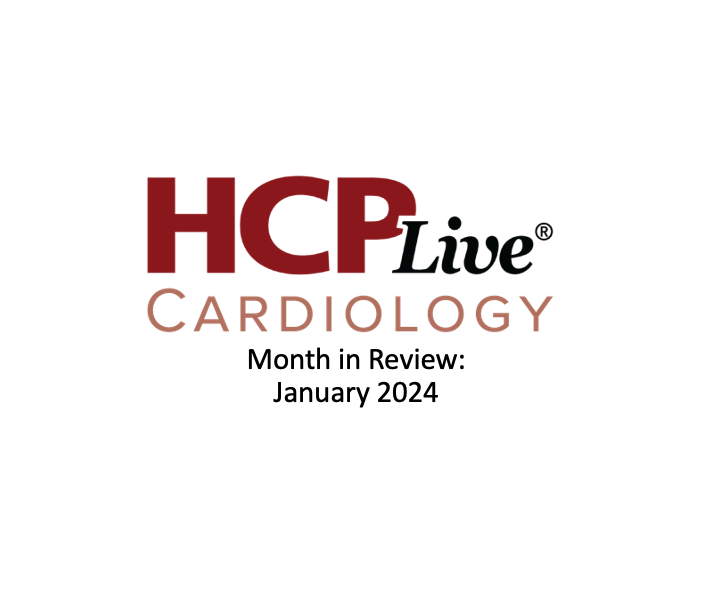News
Article
Cardiology Month in Review: January 2024
Author(s):
This recap of top cardiology news from January 2024 spotlights pipeline updates, new guidance on peripheral interventions, and a celebration of what may be the single most impactful public health address in the history of the United States.

As a result of the implications on public health across the US, advances in cardiology often come to the forefront of discussions about news and updates in healthcare. This was true throughout 2023 and remained true during the first month of 2024.
In this cardiology month in review for January 2024, we recap the most important and most popular stories in the field during the first 31 days of the year. This recap spotlights pipeline updates, new guidance on peripheral interventions, and a celebration of what may be the single most impactful public health address in the history of the United States.
Pipeline Updates in Cardiology
AT-001 Fails to Achieve Significance for Primary Endpoint in ARISE-HF
In recent years, few areas in cardiovascular medicine have seen the same rapid acceleration in pipeline prospects and advancements in pharmacotherapies as cardiomyopathies. Although much of this has centered around advances related to the cardiac myosin inhibitor class and its benefits in obstructive hypertrophic cardiomyopathy, many in the community have looked ahead with excitement to the results of the ARISE-HF trial, which examines Applied Therapeutics’ selective aldose reductase inhibitor AT-001 in diabetic cardiomyopathy.
On January 04, 2023, Applied Therapeutics announced topline results of the ARISE-HF trial, which found use of AT-001 was associated with a favorable, but nonsignificant trend toward benefit for Peak VO2 relative to placebo therapy. Further analysis suggested a greater degree of benefit among patients not concomitantly treated with SGLT2 inhibitors or GLP-1 receptor agonists. The full trial results will be presented in a late-breaking session the American College of Cardiology 73rd Annual Scientific Session.
on January 25, 2024, Liquidia Corporation provided an update related to the FDA’s ongoing review of their New Drug Application for treprostinil inhalation powder (Yutrepia). In their release, the company noted the FDA declined to provide an action letter in time for the January 24, 2024 PDUFA date and the review of the company’s New Drug Application to add a pulmonary-hypertension with interstitial lung disease indication to the labeling.
The company noted the FDA had informed them it is confirming the process for adding and the agency’s review remains ongoing. The company also noted the FDA did not request any additional information to support the NDA and declined to issue a new PDUFA goal date.
CLEAR Outcomes Analysis Finds Bempedoic Acid Reduces Total Cardiovascular Events by 20%
New data from a prespecified analysis of the CLEAR Outcomes trial is offering further insight into the effects of bempedoic acid (Nexletol) ahead of the agent’s March 2024 PDUFA date for a label update reflecting cardiovascular risk reduction. An analysis of the trial examining the totality of events from within the trial, which included more than 13,900 patients, results indicate use of bempedoic acid was associated with statistically significant relative risk reductions of 20%, 17%, 31%, and 32% for 4-point major adverse cardiovascular events (MACE), 3-point MACE, myocardial infarction, and coronary revascularization.
New Guidance on Peripheral Interventions
Expert Panel Supports Intravascular Ultrasound Use in Peripheral Interventions
A multidisciplinary expert panel assembled by the Society for Cardiovascular Angiography & Interventions (SCAI) advocated for the increased use of intravascular ultrasound (IVUS) among patients undergoing lower extremity revascularization procedures.
Released on January 09, 2024, the expert consensus roundtable was co-sponsored by f5 cardiovascular specialty societies: the American Vein and Lymphatic Society, American Venous Forum, Society of Interventional Radiology, Society for Vascular Medicine, and Society for Vascular Surgery.
Celebrating Advances in Cardiovascular Medicine and Public Health
2024 Heart Disease and Stroke Statistics
Despite being the leading cause of death in the US for more than a century, more than half of the respondents to a 2023 survey conducted on behalf of the American Heart Association failed to identify heart disease as the leading killer of US adults, according to the AHA’s 2024 Heart Disease and Stroke Statistics report.
Data from the report, which was released on January 24, 2024, highlight a lack of awareness surrounding the impact of cardiovascular disease, with additional statistics painting a picture where 51% failed to identify heart disease as the leading cause of death. However, the report also spotlights how advances in care and education have caused death rates from cardiovascular disease to decline by 60% in the last 75 years.
60 Years of Progress: How the 1964 Surgeon General Report Has Shaped Modern Healthcare
January 2024 marked 60 years since the delivery of the 1964 Surgeon General Report. Titled Smoking and Health: Report of the Advisory Committee to the Surgeon General of the Public Health Service, the 387-page document officially publicized an anti-smoking stance on behalf of the US government, citing a link between smoking with pulmonary and cardiovascular diseases. In this feature, we acknowledge the impact of this report, its subsequent effect on public health, and present-day hurdles to optimized public health efforts through the eyes of our editorial advisory board members, as well as leading experts.
Related: LungCast: Reflecting on the 1964 Surgeon General Report with Viet Le, DMSc, PA-C





